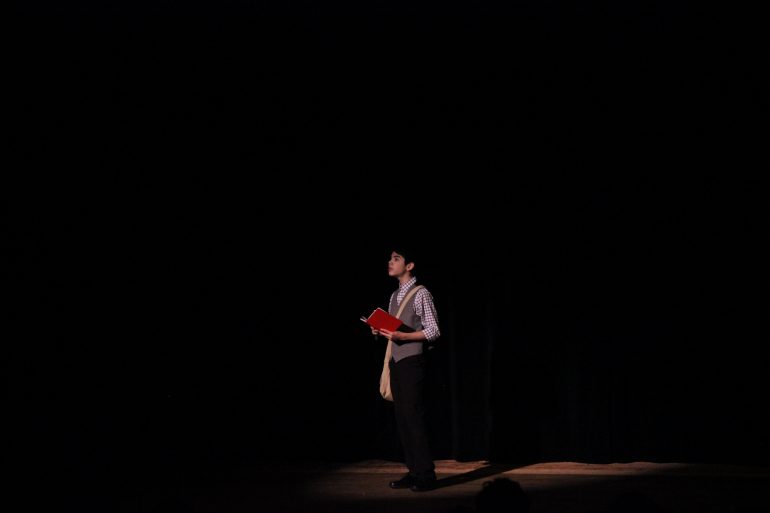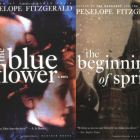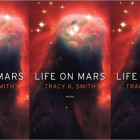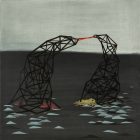First Drafts: Playwriting. A Conversation with Beth Henley, Young Jean Lee, and Enrique Urueta

I’ll admit up front: of all the literary genres, I know the least about playwriting. I’ve written fiction and nonfiction, obviously, and I’ve dabbled (mostly unsuccessfully) in poetry, but the stage play? Never attempted it. I’m not sure why. When I’m at conferences or artists’ colonies, I never miss a playwright’s performance. They’re invariably my favorites. I’ve attended readings by all three of the writers I interviewed for this post—Young Jean at Yaddo, Beth and Enrique at Sewanee—and I remember them in a way I don’t (or can’t) remember the fiction and poetry readings. There’s an immediacy to the dramatic work, a visual and tactile accessibility; so much is communicated externally, through movement and dialogue—inflection, word choice, the well-placed pause.
And though the novelist or poet can, in some sense, work in silence, writing for an unknown reader (or perhaps an ideal reader), the playwright can never forget her audience. I’ve often wondered if I would write differently if I knew, as the playwright knows, that when I’m finished, a large crowd will be sitting in a darkened theater, waiting for the curtain to rise. Would I cut to the chase, eliminate the excess, be more ruthless about my pacing? Would I be more generous in my descriptions, include more sensory detail? Would I think more about character motivation, if I knew there were trained actors in the wings, counting on me to give them authentic, compelling voices?
Also—though they’re meant for performance—I love reading plays. So far I’ve only brushed the surface: Shakespeare, Chekhov, Beckett, Albee, Stoppard, Tennessee Williams. More recently, John Patrick Shanley. I can’t think of a more instructive practice for the fiction writer (for dialogue in particular). I’d love to hear your suggestions for further reading, especially contemporary playwrights.
Screenwriters too. Another shameful admission: I’ve never read a screenplay.
For now, read on…
1. How do your plays come to you?
Beth Henley: They come from a yearning, a desire, a wondering. Some emptiness inside that starts to throb.
Young Jean Lee: When starting a play, I ask myself, “What’s the last play in the world I would ever want to write?” Then I force myself to write it. I do this because I’ve found that the best way to make theater that unsettles and challenges my audience is to do things that make me uncomfortable. I’m obsessed with unsettling complacency, both in myself and in my audiences, because I think that contradiction and uncertainty bring us closer to the truth than pat ideologies.
Enrique Urueta: The inspirations for my plays are as different as the plays themselves. The incomparable fabulosity of Trannyshack (a San Francisco drag show) and my complete love for San Francisco led to The Danger of Bleeding Brown. The realization that both Shakira and Salma Hayek are of Lebanese descent sent me on the wacky path of Learn To Be Latina. During my first semester of grad school, I became obsessed with Neko Case’s beautiful and haunting song “Star Witness” at a time when I was mourning my first relationship and longing for home (both San Francisco and South Boston, VA), which resulted in Forever Never Comes. My current project began as an experiment to see what would happen if I collided Greek mythology, Wonder Woman, Mean Girls, and competitive cheerleading. I feel like I’m constantly bombarded with inspiration, but it’s only when the inspiration feeds me a compelling character that I can truly get to work.
2. On any given day, I’ll have a number of ideas in my head; most never make it to the initial drafting phase. How do you know when it’s time to start drafting? What drives you to the page?
BH: I write all sorts of stream of consciousness stuff into spiral notebooks. I fill a lot of them. I read them over and see what grains emerge. If there are things that intrigue me I circle them and ponder. Later, I type the things I’ve circled onto the computer, dividing them into categories: theme, character, dialogue, random dialogue, images, set, costume, scene, tone, story, action, miscellaneous, and so forth. I go through all the notebooks doing this. In the end it’s so boring I start to write.
YJL: I dread writing so much that I’ve come up with the following method for developing new work: I set the date for a premiere, hire actors, and rent rehearsal space. Before the first rehearsal, I’m forced to write something for the actors to rehearse. I’ll bring in some text and then take it home and revise it for the next rehearsal. When the marketing people bug me for blurbs, I’m forced to commit to my overarching concept.
EU: I read an interview with a writer who said thinking about writing is a lot like dancing about calculus, but I don’t feel like I can do anything until I let my characters live in my head for a while. I have long conversations with them and transcribe their responses so I get a feel for who they are and how they talk. Then I think about what event happens that changes each of their normal days—why is this day different from all other days? That gives me a starting point. I think of a final image/feeling as a tentative endpoint. Finally, I make lists of objects, actions, events, locations, and theatrical/formal constraints and pick out five to ten incongruous elements to include in the play. Most importantly, I need to know and articulate why I need to write this–why is it important to me?
3. Where/how do you draft?
BH: I do first drafts in a spiral notebook using a pencil usually. I like to sit on the velvet sofa in my office—barefoot—while I write.
YJL: At home in my bedroom on my laptop. People keep telling me to try to write elsewhere using different tools to help with my writer’s block, but I never do.
EU: Once I’m through with prep work, I carve out 3-5 days, stock up on food/Red Bull/vodka, and hole up in my room to write. I act out the parts and play the hell out of monologues as I draft. I try to write quickly, working from impulse rather than intellect, which gives me the freedom to take risks, have gaps, and surprise myself. I think I can write a first draft in this intense way because I’ve done so much prep work. I only make an outline after I write a first draft and then spend a couple of months making spreadsheets to track information about each character and every location from scene to scene.
4. Are there differences in your drafting process depending on the type of play you’re writing? How many drafts do you typically take a play through?
BH: I often do ten or more drafts of a play. Between each draft I try to do a reading or workshop of the play – even if only in my living room.
YJL: I usually do around a hundred drafts over the course of a few years, and that stays pretty much the same no matter what I’m writing. My last show, Untitled Feminist Show, had no words, but I still drafted and redrafted that show with bodies in space.
EU: Aside from the cities where I wrote them, the process has been the same. I typically work through 5-10 drafts, rewriting after readings with actors and script development workshops.
5. Let’s talk for a moment about adaptation. Have you ever adapted a novel, story, poem, etc. for stage, or a play for film? How does the experience differ from writing original material?
BH: I have adapted books, short stories, articles, and my own plays for the screen. I love it because I don’t have to face the void. Also there is money and support involved. You get paid to start and when you get confused there are producers or a director to call. Writing something from scratch is more difficult. That is why I prefer it.
YJL: My first play was an adaptation of a racist B-movie called The Mask of Fu Manchu, and one of my recent plays was an adaptation of King Lear. For the Fu Manchu adaptation, I borrowed the basic plot structure but changed everything within that. For the Lear adaptation, I got rid of all the older characters and focused on the adult children, creating a fictional scenario in which they were hanging out in a castle together while their fathers were out in the storm. And then the second half of the play turned into an episode of Sesame Street.
EU: There’s a lot of fiction and poetry I’d love to adapt, but haven’t yet. My play Forever Never Comes is an adaptation of Neko Case’s album Fox Confessor Brings The Flood. I spent days listening to her music and arranged a sequence of songs that I felt told an emotional narrative. I kept that sequence in mind as I worked through the process I described earlier, and arrived at a story that I felt gave body to the emotional narrative. Sometimes the songs gave back story or plot points to work from, and I learned things that led me to shift the soundtrack. I didn’t know what the hell I was doing, but it worked for me. I neglected to say earlier that I write all my plays with an emotional narrative soundtrack in mind, but Forever Never Comes was different in that I was directly attempting to literalize the narrative of Case’s very poetic songs.
6. Do you have a first draft anecdote—a favorite experience, a nightmare story?
BH: Every time I’m writing a first draft, I get afraid I’ll die before it’s finished. I have never left a play unfinished because I feel a pure responsibility to the play and characters.
YJL: All of my first drafts are a nightmare to come up with, so I don’t have a favorite. My least favorite experience was my last show, Untitled Feminist Show, because I wasn’t expecting it to be wordless, and I was totally unequipped and unprepared to make a dance show.
EU: Because all my first drafts are written in intense bursts, the experiences of each are burned in my mind. And because they have been written in different cities, they’re like a collective textual scrapbook of the places I’ve lived. If I had to pick a favorite, I’d say it was drafting The Danger of Bleeding Brown. It was my first play and it made me realize I could do this.
Bios:
Beth Henley: Playwright and screenwriter Beth Henley first entered the critical spotlight in 1978 when one of her plays—a black comedy about three maladjusted sisters set in the small town of Hazlehurst, Mississippi—won the Great American Play Contest sponsored by the Actors Theatre in Louisville, Kentucky. Crimes of the Heart went on to win several more awards, including the New York Drama Critics Circle Award for best new American play and the Pulitzer Prize for drama, both in 1981. Henley also received a Tony Award nomination for best play and, five years later, an Academy Award nomination for Best Adapted Screenplay. Henley followed the success of Crimes of the Heart with The Miss Firecracker Contest, which was first produced onstage in Los Angeles in 1980 and was likewise adapted into a Hollywood film with a screenplay by Henley. Other plays include The Wake of Jamey Foster (1982), The Debutante Ball (1985), The Lucky Spot (1987), and Abundance (1989). More recent plays include Signature, Control Freaks, L-Play, Impossible Marriage, Family Week, and Ridiculous Fraud. Her newest play The Jacksonian was produced this year at The Geffen Playhouse to much acclaim. In addition to playwriting, Henley has written several television and movie screenplays, including “Survival Guides” with Budge Threlkeld for PBS (1985), the film Nobody’s Fool (1986), and True Stories, on which she collaborated with Steven Trobolowsky and David Byrne, the lead singer of the rock group Talking Heads, who directed and starred in the film.
Young Jean Lee is a playwright and director who has been called “the most adventurous downtown playwright of her generation” by the New York Times and “one of the best experimental playwrights in America” by Time Out New York. She has written and directed nine shows in New York with Young Jean Lee’s Theater Company and toured her work to over twenty cities around the world. Her plays have been published by Theatre Communications Group (Songs of the Dragons Flying to Heaven and Other Plays, The Shipment, and Lear) and by Samuel French (Three Plays by Young Jean Lee). She is currently under commission from Plan B/Paramount Pictures, Lincoln Center Theater, Playwrights Horizons, and the Oregon Shakespeare Festival. She is a member of New Dramatists and 13P and has an MFA from Mac Wellman’s playwriting program at Brooklyn College. She has received grants from the Foundation for Contemporary Arts, Creative Capital, NYFA, NEA, NYSCA, the Jerome Foundation, the Greenwall Foundation, and the Rockefeller MAP Foundation. She is also the recipient of two OBIE awards, the Festival Prize of the Zuercher Theater Spektakel, a 2010 Prize in Literature from the American Academy of Arts and Letters, a 2011 Guggenheim Fellowship, and a 2012 Doris Duke Artist Award.
Enrique Urueta’s plays include The Johnson Administration, The Danger of Bleeding Brown, Learn To Be Latina, and Forever Never Comes. His plays have been developed or produced by The Queer Cultural Center, Playwrights Foundation, Lark Play Development Center, Impact Theatre, Golden Thread Productions, Crowded Fire Theater Company, and Stray Cat Theatre. He has received a Jerome Fellowship from The Playwrights’ Center of Minneapolis, a Theatre Bay Area CASH grant, a Theatre Bay Area New Works Fund award for Forever Never Comes and was selected by Sir David Hare as a runner-up for the 2009 Yale Drama Series prize for The Danger of Bleeding Brown. Learn To Be Latina received Aurora Theatre Company’s Global Age Project award, won the inaugural Great Gay Play contest sponsored by Pride Films & Plays, and was named Best Ensemble Comedy of 2010 by the SF Weekly, which also named him Best Up-And-Coming Playwright of 2010. Southern Theatre Magazine identified him as one of “40 Groundbreaking Playwrights” who are “changing the U.S. theatre.” He is a proud member of NoPassport, an on-line collective of theatre artists who advocate for cross-cultural theatrical exchange, with an emphasis on US Latina/o and Latin American theatre. He holds a BA from The College of William & Mary and an MFA from Brown University.



